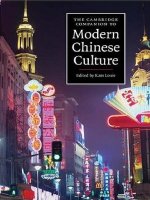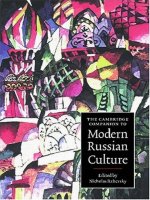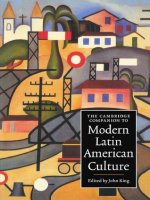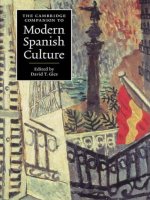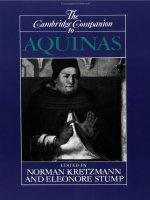the cambridge companion to modern latin american culture
Bạn đang xem bản rút gọn của tài liệu. Xem và tải ngay bản đầy đủ của tài liệu tại đây (1.85 MB, 370 trang )
The Cambridge Companion to
Modern Latin American Culture
The term Latin America refers to the Portuguese and Spanish-speaking
states created in the early 1820s following the wars of independence,
states that differed enormously in geographical and demographic
scale, ethnic composition and economic resources, yet shared distinct
historical and cultural traits. Specially commissioned essays by leading
experts explore the unity and diversity of the region’s cultural
expressions. These essays analyse history and politics from the
nineteenth century to the present day and consider the heritage of
pre-Columbian and colonial Latin America. There is a particular focus
on narrative as well as on poetry, art and architecture, music, cinema,
theatre, and broader issues of popular culture. A final chapter looks at
the strong and rapidly expanding influence of Latino/a culture in the
United States. A chronology and guides to further reading are included,
making this volume an invaluable introduction to the rich and varied
culture of modern Latin America.Cambridge Companions to Culture
The Cambridge Companion to Modern German Culture
Edited by Eva Kolinsky and Wilfried van der Will
The Cambridge Companion to Modern Russian Culture
Edited by Nicholas Rzhevsky
The Cambridge Companion to Modern Spanish Culture
Edited by David T. Gies
The Cambridge Companion to Modern Italian Culture
Edited by Zygmunt G. Bara
´
nski and Rebecca J. West
The Cambridge Companion to Modern French Culture
Edited by Nicholas Hewitt
The Cambridge Companion to Modern Latin American Culture
Edited by John King
Modern Latin American Culture
edited by
john king
published by the press syndicate of the university of cambridge
The Pitt Building, Trumpington Street, Cambridge, United Kingdom
cambridge university press
The Edinburgh Building, Cambridge, cb22ru,UK
40 West 20th Street, New York, ny 10011– 4211, USA
477 Williamstown Road, Port Melbourne, vic 3207, Australia
Ruiz de Alarc
´
on 13, 28014 Madrid, Spain
Dock House, The Waterfront, Cape Town 8001, South Africa
C
Cambridge University Press 2004
This book is in copyright. Subject to statutory exception
and to the provisions of relevant collective licensing agreements,
no reproduction of any part may take place without
the written permission of Cambridge University Press.
First published 2004
Printed in the United Kingdom at the University Press, Cambridge
Typeface Lexicon 9/13 pt. System L
A
T
E
X2
ε
[tb]
A catalogue recordforthisbook is available from the British Library
Library of Congress Cataloguing in Publication data
The Cambridge companion to modern Latin American culture / edited by John King.
p. cm – (Cambridge companions to culture)
Includes bibliographical references and index.
isbn 0 521 63151 3 – isbn 0 521 63651 5 (pbk.)
1. Latin American – Civilization. 2. Arts, Latin American. i. King, John, 1950– ii. Series.
f1408.3.c283 2003
980.03 – dc21 2003053229
isbn 0 521 63151 3 hardback
isbn 0 521 63651 5 paperback
The publisher has used its best endeavours to ensure that URLs for external websites referred
to in this book are correct and active at the time of going to press. However, the publisher has
no responsibilityfor thewebsites andcan make noguarantee thata sitewill remainliveor that
the content is or will remain appropriate.
Contents
List of illustrations page ix
Notes on contributors x
Acknowledgements xiii
Note on translations xiv
Chronology of major events xv
Map 1 Latin America, 1830 xxv
Map 2 Latin America, 2000 xxvi
Introduction 1
john king
1 Pre-Columbian and colonial Latin America 9
anthony m
C farlane
2 Latin America since independence 28
james dunkerley
3 Spanish American narrative, 1810– 1920 60
gwen kirkpatrick
4 Spanish American narrative, 1920– 1970 84
jason wilson
5 Spanish American narrative since 1970 105
gerald martin
6 Brazilian narrative 119
randal johnson
7 Latin American poetry 136
william rowe
viii Contents
8 Popular culture in Latin America 171
vivian schelling
9 Art and architecture in Latin America 202
valerie fraser
10 Tradition and transformation in Latin American
music 236
catherine den tandt and richard young
11 The theatre space in Latin America 258
catherine boyle
12 Cinema in Latin America 282
john king
13 Hispanic USA: literature, music and language 314
ilan stavans
Index 344
Illustrations
1. David Alfaro Siqueiros, ‘From the University to the People and the
People to the University’, 1952, Rectorate Building, UNAM campus,
Mexico City (photo Valerie Fraser). page 213
2. Carlos Cruz-Diez, ‘Physichromie No. 1270’. Mixed Media, 1990.
Reproduced by permission of the University of Essex Collection of Latin
American Art. 216
3. Amilcar de Castro, Untitled, 1980. Reproduced by permission of the
University of Essex Collection of Latin American Art. 217
4. Roberto Matta, ‘The End of Everything’, 1942. Reproduced by
permission of the University of Essex Collection of Latin American
Art. 219
5. Nadin Osp
´
ına, ‘Idol with doll’, 2000. Reproduced by permission of the
University of Essex Collection of Latin American Art. 221
6. Juan O’Gorman, studio house of Diego Rivera and Frida Kahlo, 1931–2,
Mexico City (photo Valerie Fraser). 224
7. Oscar Niemeyer, Itamarat
´
ı Palace, 1962, Bras
´
ılia (photo Valerie
Fraser). 229
8. Manuel Medel and Mariano Moreno ‘Cantinflas’ in El signo de la muerte,
1939. Reproduced by permission of the Instituto Mexicano de
Cinematograf
´
ıa Archive. 289
9. Dolores del R
´
ıo in Flor silvestre, 1943. Reproduced by permission
of the Instituto Mexicano de Cinematograf
´
ıa Archive. 290
10. Lima Barreto’s O cangaceiro, 1953. Reproduced by permission of the
British Film Institute Archive. 293
11. Hemingway’s house in Memorias del subdesarrollo, 1968. Reproduced
by permission of ICAIC Archive, Havana. 297
12. Gael Garc
´
ıa Bernal in Amores perros, 2000. Reproduced by permission
of Optimum Releasing.
c
Optimum Releasing, 2001. 305
13. Sor Juana (Assumpta Serna) renounces her intellectual work and writes
‘I The Worst of All’ in her own blood. From Yo la peor de todas, 1990.
Reproduced by permission of Lita Stantic. 309
Notes on contributors
catherine boyle is Reader in Latin American Literary and Theatre
Studies at King’s College, London. She is the author of Chilean Theatre
1973–1985: Marginality, Power and Selfhood (1992) and has published
widely on Latin American theatre. She is a co-founder and editor of
the Journal of Latin American Cultural Studies.
catherine den tandt Associate Professor of Hispanic Studies in the
Department of Modern Languages and Literatures at the University of
Montreal. Her research focuses on contemporary Caribbean culture,
especially the Hispanic Caribbean. Her current project explores how
Caribbean culture and Caribbean culture critics have responded to the
pressures of globalization. She has written on Puerto Rican and
Qu
´
eb
´
ecois cultural politics, on women’s writing, race and identity in
Puerto Rico and on Caribbean popular music.
james dunkerley is Director of the Institute of Latin American Studies,
and Professor of Politics, Queen Mary, University of London. Amongst
his books are Americana: The Americas in the World, around 1850 (2000),
and (edited with Victor Bulmer-Thomas) The United States and Latin
America: The New Agenda (2000). He is currently preparing a study of the
Bolivian Revoluton.
valerie fraser teaches at the University of Essex and is co-director of
the University of Essex collection of Latin American Art. Publications
include Drawing the Line: Art and Cultural Identity in Contemporary Latin
America (with Oriana Baddeley, 1989), The Architecture of Conquest:
Building in the Viceroyalty of Peru 1535–1635 (1990) and Building the New
World: Studies in the Modern Architecture of Latin America 1930–1960 (2000).
randal johnson is Professor of Brazilian Literature and Culture at the
University of California, Los Angeles. He is the author of Literatura e
Cinema: Macunaima do Modernismo da Literatura ao Cinema Novo (1982),
Cinema Novo x5: Masters of Contemporary Brazilian Film (1984), The Film
Notes on contributors xi
Industry in Brazil: Culture and the State (1987), and Antonio das Mortes
(1998) and is editor, or co-editor of Brazilian Cinema (1982; expanded
edn, 1995), Pierre Bourdieu’s The Field of Cultural Production (1993) and
Black Brazil: Culture, Identity and Social Mobilization (1999).
john king is Professor of Latin American Cultural History at the
University of Warwick. He has authored and edited some ten books on
Latin American cinema, literature and cultural history. His most
recent publications include Magical Reels: A History of Cinema in Latin
America (expanded edition, 2000) and, co-edited with Sheila Whitaker
and Rosa Bosch, An Argentine Passion: The Life and Work of Mar
´
ıa Luisa
Bemberg (2000).
gwen kirkpatrick is Professor of Latin American Literature in the
Department of Spanish and Portuguese at the University of
California, Berkeley. She has published on Spanish American
modernismo, primarily on Leopoldo Lugones, Julio Herrera y Reissig
and Delmira Agustini; modern poetry (Neruda, Storni, Cabral de
Melo Neto, Vallejo, etc.); and other topics in literature and gender
studies. Her most recent writings have focused on contemporary
Chilean literature.
gerald martin is Andrew Mellon Professor of Modern Languages at the
University of Pittsburgh and president of the International Institute
of Ibero-American Literature. Publications include Journeys Through the
Labyrinth (1989), critical editions of Miguel Angel Asturias’s Hombres de
ma
´
ız (1992) and El Se
˜
nor Presidente (2000), as well as several major
contributions to the Cambridge History of Latin America. He is currently
completing a biography of Gabriel Garc
´
ıa M
´
arquez.
anthony m
C farlane is Professor of Latin American History at the
University of Warwick. Publications include Colombia Before
Independence: Economy, Society and Politics Under Bourbon Rule (1993) and
The British in the Americas, 1480–1815 (1994). He is completing a study of
the Wars of Independence in Spanish America.
william rowe has taught at the universities of San Marcos (Lima),
Liverpool, King’s College London, Universidad Iberoamericana
(Mexico) and is currently Anniversary Professor of Poetics at Birkbeck
College, University of London. At King’s College he was Professor of
Latin American Cultural Studies and founder of the Centre for Latin
American Cultural Studies and the Journal of Latin American Cultural
Studies. The author of many books on Latin American literature and
culture, his most recent work is Poets of Contemporary Latin America:
History and the Inner Life (2002).
vivian schelling is Senior Lecturer in the Department of Cultural
Studies at the University of East London. She is the co-author, with
xii Notes on contributors
William Rowe, of Memory and Modernity: Popular Culture in Latin America
(1991). She has recently edited Through the Kaleidoscope: The Experience of
Modernity in Latin America (2000).
ilan stavans is Lewis-Sebring Professor of Latin American and Latino
Cultures at Amherst College. His books include The Hispanic Condition
(1995, expanded edition 2001), The Oxford Book of Latin American Essays
(1997), The Riddle of Cantinflas (1998), Mutual Impressions (1999), On
Borrowed Words: A Memoir of Language (2001), and Spanglish: The Making of
a New American Language (2003). In 2000 Routledge published The
Essential Ilan Stavans.
jason wilson is Professor of Latin American Literature at University
College, London. He has published extensively on Latin American
poetry, surrealism, travel writing and literary translation. His most
recent publication is an edition and translation of Bernardin de Saint
Pierre’s Journey to Mauritius (2001).
richard young teaches courses in literature, film and popular music in
the Spanish and Latin American Studies programme at the University
of Alberta. He is author of several books including Octaedro en 4 tiempos
(1993). He has edited Latin American Postmodernisms (1997) and Music,
Popular Culture, Identities (2002) and has been editor of the Revista
Canadiense de Estudios Hisp
´
anicos since 1996.
Acknowledgements
I would like to thank Kate Brett, Rachel de Wachter, Paul Watt and in
particular Linda Bree at Cambridge University Press for their support,
patience and very detailed and careful editorial guidance. Jacqueline
French copy-edited the typescript with meticulous care. My thanks also
to the contributors to this volume for their knowledge and forbearance.
Pauline Yates in Computer Services at Warwick University offered valu-
able guidance at many stages in the overall preparation of the book. The
Humanities Research Centre at Warwick supported the project. Valerie
Fraser, Sheila Whitaker and Rosa Bosch helped to locate illustrations.
Note on translations
The titles of original works in the text are followed by an English trans-
lation in parentheses. Dates refer to the first publication unless indicated
otherwise. In cases where there are no published translations a literal
translation is provided within square brackets. Translations within the
text are those of the individual contributors to this volume unless a
printed source is quoted.
Chronology
1488 Bartolomeu Dias rounds southern tip of Africa, opening
for Portugal an eastern maritime route to the Far East
1492 Columbus searches for westward route to Asia and makes
first European contact with America; Spanish conquest
of Moorish kingdom of Granada; expulsion of Jews from
Spain
1493 Columbus’s second voyage; establishment of first
Spanish settlement on Hispaniola
1494 Treaty of Tordesillas: Castile and Portugal agree to
partition exploration and exploitation of the world
1498 Vasco de Gama sails Portuguese fleet to India;
Columbus’s third voyage brings first certain sighting of
South America
1500 Pedro Alvares Cabral, commanding second Portuguese
fleet for India, lands on coast of Brazil and claims it for
Portugal
1500– 2 America Vespucci sails down east coast of South America
1502– 4 Columbus’s fourth voyage surveys coasts of Central
America
1502– 9 Nicol
´
as de Ovando takes expedition of settlement to
Hispaniola and becomes the first royal governor
1507 Martin Waldseem
¨
uller makes first world map, showing
‘America’, named in honour of Amerigo Vespucci
1511 Foundation of Santa Mar
´
ıa del Darien, first Spanish town
on American continents; conquest of Cuba from
Hispaniola; establishment at Santo Domingo of first
Audiencia; Antonio de Montesinos preaches sermon
xvi Chronology of major events
criticizing colonists’ behaviour towards the Indians on
Hispaniola
1512 Arrival of first bishop in America; Laws of Burgos lay
down first royal regulations for the treatment of Indians
1513 Vasco Nu
˜
nez de Balboa crosses Isthmus of Panama and
opens way to the Pacific; Juan Ponce de Le
´
on claims
Florida for Spain
1516 Portuguese trading post established at Pernambuco; first
sugar cultivation in Brazil; Spanish crown names
Bartolom
´
e de las Casas ‘Protector of the Indians’
1518– 28 Smallpox epidemics in Caribbean, Mesoamerica and
Andes
1519– 21 Hern
´
an Cort
´
es conquers the Aztecs and makes
Tenochtitl
´
an the capital of his government, as Mexico
City
1524 First Franciscan missionaries arrive in New Spain
[Mexico], as precursors of other missionary orders and
vanguard for evangelization of the native peoples of
America
1530– 3 Measles epidemics in Mesoamerica and Andean America
1532 Portuguese settlement at S
˜
ao Vicente, followed by
further settlements in Brazil and division of Brazil into
captaincies
1532– 6 Francisco Pizarro conquers the Incas, takes Cuzco and
founds city of Lima
1535 Viceroyalty of New Spain established
1536 First foundation of Buenos Aires
1538 Foundation of Santaf
´
e de Bogot
´
a and beginnings of
Spanish settlement in New Granada [Colombia].
Probable date of arrival of first African slaves in Brazil
1541 Foundation of Santiago de Chile begins colonization of
Chile. Buenos Aires destroyed
1543 Viceroyalty of Peru founded
1545 Silver ores discovered at Potos
´
ı in Upper Peru
1546 Silver ores found at Zacatecas in northern Mexico
1545– 6 Typhus, pulmonary plague epidemics in Mesoamerica
and Andean America
1548 Foundation of La Paz [Bolivia]
Chronology of major events xvii
1548– 9Tom
´
e de Sousa installed as governor general of Brazil;
foundation of Salvador [Bahia] as capital
1550 Debate between Las Casas and Sep
´
ulveda at Valladolid,
Spain, over the nature of the Indians
1557– 63 Measles, influenza, mumps, diphtheria epidemics
further reduce populations in Spanish America; start of
the first serious epidemics in Brazil
1572 Fall of last Inca stronghold in Peru
1580 Buenos Aires refounded
1580– 1640 Portugal and its empire under Spanish rule
1630– 54 Dutch occupy north-eastern Brazil and develop sugar
plantations, using African slave labour
1690s Discovery of gold in Brazil; beginnings of gold rush and
development of Brazilian interior, in S
˜
ao Paulo area
1701 Accession of Bourbon Philip V to Spanish throne,
followed by the War of the Spanish Succession
1714 Ministry of the Indies created by Philip V; first efforts to
reform government of Spanish empire begin
1739 Establishment of Viceroyalty of New Granada, with
capital in Santaf
´
e de Bogot
´
a
1755 Beginning of reform programme for Portugal and Brazil
by Marquis of Pombal
1759 Jesuits expelled from Portuguese territories
1762 Capture of Havana by British
1763 Peace of Paris restores Havana to Spanish rule; Spanish
review of government and defences of Cuba starts process
of reform which will spread to Spain’s other colonies.
Capital of Brazil shifted from Salvador to Rio de Janeiro
1764 First reforms to Spain’s system of regulating trade with
its American colonies
1765 Jos
´
edeG
´
alvez begins ‘general inspection’ of New Spain,
setting in motion Bourbon reforms of government and
taxation in Spanish America. First major anti-reform
rebellion in Quito
1767 Jesuits expelled from Spanish territories
1776 Creation of the Viceroyalty of R
´
ıo de la Plata, with capital
in Buenos Aires
1780– 2 Great Indian rebellion led by T
´
upac Amaru in Peru
xviii Chronology of major events
1781 Anti-government rebellion in New Granada by the
‘Comuneros’
1788– 9 Conspiracy to overthrow Portuguese government
discovered and suppressed at Minas Gerais
1791 Slave revolt in French Caribbean at Saint Domingue
[Haiti]
1797 British take Trinidad from Spain
1805 Francisco de Miranda mounts abortive rebellion in
Venezuela
1806– 7 British temporarily take Montevideo and Buenos Aires
1807 Franco-Spanish invasion of Portugal; Portuguese
monarchy moves to Brazil
1808 Charles IV of Spain abdicates in favour of his son,
Ferdinand VII. French occupation of Spain. Ferdinand
abdicates and Napoleon places his brother Joseph on
Spanish throne. Revolt in Madrid starts Spanish war of
national liberation against France
1810 Declarations of self-government in Caracas, Bogot
´
a,
Buenos Aires, Santiago de Chile. Start of popular
insurrection against Spanish government in Mexico, led
by Father Hidalgo. Establishment at C
´
adiz of Cortes, or
parliament, for the Hispanic world
1812 Constitution of C
´
adiz creates new institutional
framework for government in Spain and its empire, as a
constitutional monarchy
1814 Ferdinand VII restored to Spanish throne; suppresses
Constitution of C
´
adiz; plans reconquest of independent
Spanish American territories
1815– 16 Restoration of Spanish government throughout Spanish
America, except the River Plate provinces
1816 United Provinces of R
´
ıo de la Plata declare independence
1818 Spanish defeat in Chile at battle of Maip
´
u
1819 Simon Bol
´
ıvar defeats Spanish army at Battle of Boyac
´
a;
declares Republic of Colombia
1820 Jos
´
e San Mart
´
ın invades royalist Peru. Military revolt in
Spain and restoration of Constitution of C
´
adiz and
constitutional monarchy. Military revolt in Portugal and
introduction of constitutional monarchy
Chronology of major events xix
1821 Battle of Carabobo brings independence to Venezuela.
Mexico declares independence
1822 Battle of Pichincha and independence for Ecuador.
Declaration of independence in Brazil under Emperor
Dom Pedro I
1824 Battles of Jun
´
ın and Ayacucho; independence of Peru
1825 Independence of Bolivia
1828 Effective independence of Uruguay
1828– 9 Civil war in Argentina
1830 Disintegration of Gran Colombia into Ecuador,
Venezuela and New Granada. Death of Bol
´
ıvar
1831 Abdication of Pedro I of Brazil
1832 British sovereignty proclaimed over Falkland Islands
1833 Abolition of slavery in British West Indies
1835 Juan Manuel de Rosas, Governor of Buenos Aires,
becomes dictator of Argentina
1836 Texas declares independence from Mexico
1840 Collapse of Central American Federation. Death of Dr
Francia, dictator of Paraguay since 1814
1845 Texas annexed to the USA
1846 US forces cross into Mexican territory, opening hostilities
1847 Caste war in Yucat
´
an, Mexico
1848 Treaty of Guadalupe Hidalgo ends Mexican-American
war, annexing California and south-western states to
USA
1850 Atlantic slave trade into Brazil ends
1852 Rosas deposed in Argentina
1855 Overthrow of Mexican dictator Santa Anna by Revolution
of Ayutla
1862 Argentina reunited. French invasion of Mexico. New
Granada renamed Colombia
1864– 70 War between Paraguay and Brazil, Argentina and
Uruguay
1867 Napoleon II withdraws army from Mexico; execution of
Maximilian
1868 ‘Ten Years War’ against Spanish rule in Cuba
1876 Porfirio D
´
ıaz comes to power in Mexico
1877 Frozen meat first shipped from Argentina to Europe
xx Chronology of major events
1879– 80 Roca completes ‘conquest of the desert’ in Patagonia
1879– 83 War of the Pacific between Chile and Peru and Bolivia
1886 Abolition of slavery in Cuba
1888 Abolition of slavery in Brazil
1889 Brazil declared a republic. Lesseps’s Panama canal
scheme collapses
1890 Baring crisis leads to collapse of British investment in
region
1891 Civil war in Chile
1895 Uprising against Spanish rule in Cuba
1898 Spanish-American War; USA occupies Cuba and Puerto
Rico
1899 ‘War of the Thousand Days’ in Colombia
1903 European powers back Venezuelan rebels and blockade
country to secure debt repayments
1909 Juan Vicente G
´
omez president of Venezuela until 1935
1911 Porfirio D
´
ıaz removed from power in Mexico; Revolution
begins
1912 Saenz Pe
˜
na law introduces compulsory male suffrage in
Argentina
1915 US incursions into Mexico; emergence of popular forces
under Villa and Zapata
1916 Opposition Radical administration under Yrigoyen
elected in Argentina
1917 Mexican constitution
1919 ‘Semana tr
´
agica’ in Argentina; massacres of Chilean
workers at Puerto Natales
1922 Tenente revolt in Brazil
1925 New Chilean constitution opens authoritarian rule
under Ib
´
a
˜
nez
1926 Deployment of US troops in Nicaragua
1927 Sandino begins resistance against US intervention in
Nicaragua
1930 Military revolt against second Yrigoyen government in
Argentina. After revolt in southern Brazil Get
´
ulio Vargas
takes presidency. Coups in Peru and Bolivia
1932 Peasant uprising in El Salvador brutally repressed. Vargas
suppresses revolt in Brazil
1932– 5 Chaco War between Bolivia and Paraguay
Chronology of major events xxi
1933 Creation of Chilean Socialist Party. US troops leave
Nicaragua. Apra proscribed by military in Peru.
Overthrow of Machado dictatorship in Cuba; ascendency
of Fulgencio Batista
1934 C
´
ardenas government in Mexico begins social reforms.
Sandino assassinated
1935 Venezuelan dictator G
´
omez dies; ten years of ‘democratic
caesarism’ follow
1937 Vargas establishes Estado Novo authoritarian regime in
Brazil
1938 Civilian government restored in Argentina. Popular
Front supports Aguirre Cerda administration in Chile.
Mexican government expropriates foreign oil companies
1942 Brazil breaks relations with Axis, joins Allied war effort
1943 Military coup in Argentina supported by Colonel Per
´
on
1944 Reformist uprising against Guatemala dictator Ubico
opens a decade of democracy
1945 Per
´
on released from jail after mass demonstrations by
trade unions. Venezuelan coup leads to reformist
government. Vargas removed by Brazilian military;
conservative Gen. Dutra wins subsequent poll
1946 Per
´
on wins Argentine elections against fierce US
opposition
1947 Brazilian Communist Party outlawed
1948 Assassination of Liberal leader Gait
´
an in Bogot
´
a opens
prolonged period of violence. Chilean Communist Party
outlawed. Restrictions on independence of Mexican
unions. Conservative coup in Venezuela paves way for
P
´
erez Jim
´
enez dictatorship
1949 New Argentine constitution, including social welfare
provisions, replaces charter of 1853
1950 Vargas re-elected president of Brazil under 1946
constitution
1952 Per
´
on re-elected president of Argentina; Evita Per
´
on dies.
Revolution in Bolivia opens twelve-year rule of MNR.
Batista declares dictatorship in Cuba
1953 Military dictatorship of Rojas Pinilla in Colombia. Failed
assault on Moncada barracks in Santiago de Cuba by
rebels led by Fidel Castro
xxii Chronology of major events
1954 Get
´
ulio Vargas commits suicide whilst in office. USA
supports counter-revolutionary intervention in
Guatemala
1955 Per
´
on overthrown by conservative military coup
1956 Kubitschek wins Brazilian elections, embarks on
accelerated industrialization. Cuban rebels under Castro
land in Sierra Maestra from Mexico
1958 Frondizi elected civilian president in Argentina with
help of Peronist votes. Coup overthrows Venezuelan
dictatorship
1959 Civilian government restored in Venezuela under
Betancourt; all major parties bar the Communists
included in constitutional accord. Victorious rebel forces
enter Havana
1960– 1 Revolutionary regime in Cuba clashes with USA and
realigns with Moscow
1961 Assassination of President Trujillo ends thirty-year
dictatorship in Dominican Republic
1962 Cuban missile crisis
1963 Guerrilla established in Venezuela with Cuban help
1964 Military coup in Brazil; tightening restrictions on
democratic freedoms. Conservative military coup in
Bolivia
1965 Crisis in Dominican Republic leads to large-scale US
military intervention
1966 Military coup leads to hardline Ongan
´
ıa regime in
Argentina
1967 Death of Che Guevara in Bolivia
1968 Reformist military government in Peru. Massacre of
protesting students in Mexico City
1969 Worker and student uprising in C
´
ordoba weakens
Argentine regime
1970 Election of Unidad Popular government under Allende
in Chile. Failure of ten-million-ton sugar harvest
campaign in Cuba
1970– 3 Argentine military regimes negotiate political
opening
1971 Venezuelan leftists re-enter constitutional politics.
Right-wing coup in Bolivia led by Gen. Banzer
Chronology of major events xxiii
1973 Per
´
on returns to Argentine presidency. Right-wing
takeover in Uruguay. Coup led by Gen. Pinochet
overthrows Allende and opens prolonged dictatorship
1974 Per
´
on dies; succeeded by his widow
1976 Reformist military regime established in Ecuador.
Military coup in Argentina opens unparalleled
repression of opposition forces
1979 Sandinistas (FSLN) overthrow Somoza dictatorship in
Nicaragua
1980 Assassination of Archbishop Romero in Salvadorean civil
war. New authoritarian constitution in Chile. Return to
civilian government in Peru
1980– 3 Extensive military repression in Guatemala resulting
from guerrilla offensive
1982 Argentine military invade Falkland Islands; defeated
after short but fierce war. Violent suppression of
anti-dictatorial protests in Chile. Civilian government
restored in Bolivia. Escalation of guerrilla activity and
social violence in Peru
1983 Civilian government restored in Argentina. US invades
Grenada
1985 Civilian government restored in Brazil
1986 Abortive assassination attempt against Pinochet.
Iran-Contra scandal reveals extent of US intervention
against Nicaraguan government
1987 Arias Plan lays basis for Central American peace accords
1988 Chilean voters reject continuation of Pinochet regime in
plebiscite
1989 Argentine government of Ra
´
ul Alfons
´
ın, beset by
economic crisis, advances poll, won by Peronists under
Menem. 35-year Stroessner dictatorship overthrown in
Paraguay. Riots in Caracas caused by efforts by new P
´
erez
administration to balance budget. US invades Panama to
overthrow Noriega regime
1990 Chilean elections won by Christian Democrat Patricio
Aylwin, who governs with coalition under partially
amended 1980 constitution. Opposition wins
Nicaraguan elections, ending FSLN rule. Fujimori wins
Peruvian elections
xxiv Chronology of major events
1992 Impeachment of Brazilian President Collor. Fujimori
stages ‘autogolpe’ to remove Peruvian Congress and
Supreme Court. First Chilean municipal elections for
twenty years. Abortive coup against P
´
erez government in
Venezuela by Comandante Hugo Ch
´
avez. Abimael
Guzm
´
an, leader of Peruvian guerrilla Sendero Luminoso,
captured. Widespread controversy over commemoration
of anniversary of 1492
1994 Establishment of North American Free Trade Area
(NAFTA) by Canada, Mexico and USA. Zapatista uprising
in Mexican state of Chiapas. Major financial stabilization
plan in Brazil designed by Fernando Henrique Cardoso.
US military intervention in Haiti to restore civilian
government
1996 Guatemalan civil war formally brought to end with
internationally brokered accords
1997 Remains of Che Guevara repatriated from Bolivia to Cuba
1998 Ex-dictator Pinochet arrested in London. Hugo Ch
´
avez
wins Venezuelan elections, starts comprehensive
remodelling of political system. Attempts by Pastrana
government to broker end to thirty-year civil conflict in
Colombia stymied; US promotes ‘Plan Colombia’
1999 Peronists lose Argentine presidential elections
2000 Fujimori resigns Peruvian presidency. Widespread
mobilization of rural communities in Bolivia and
Ecuador. Vicente Fox, candidate from the PAN (National
Action Party) wins the Mexican presidential election
Compiled by anthony m
CC farlane
and james dunkerley




